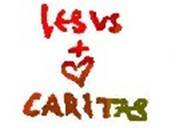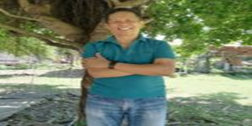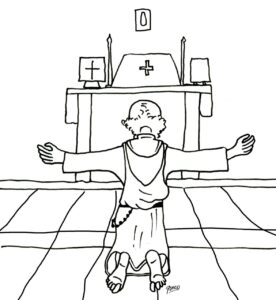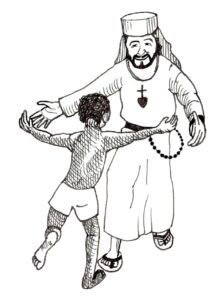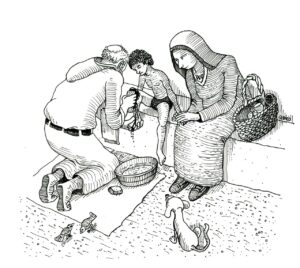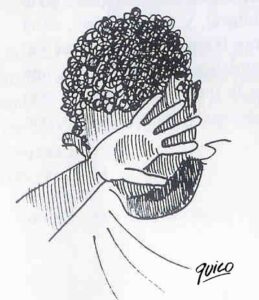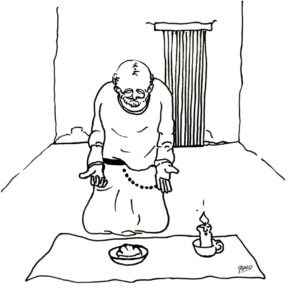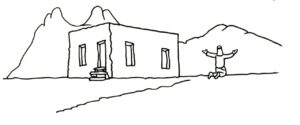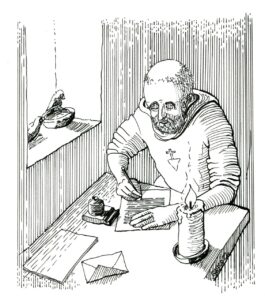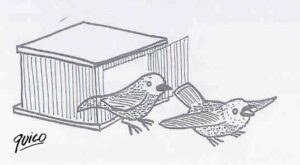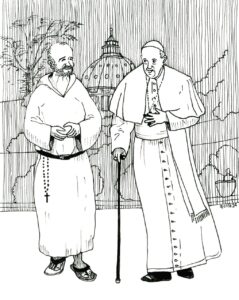Dear Brothers,
Muito Obrigado! Mille Grazie! Merci beaucoup! Muchas gracias! Baie Dankie! Mange Tak! Vielen Dank! Mèsi Anpil! Mile Maith Agat! आपका बहुत धन्यवाद! Dziękuję Bardzo! Grazzi ħafna! Thank you very much!
“If the only prayer you ever say in your entire life is “thank you,” it will be enough.” Meister ECKHART
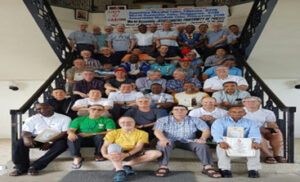 Coming from a celebration of life after death in remembrance of Jesus and of Pope Francis’ death that has left footprints of his courageous life, in solidarity with the association of the spiritual family of St Charles de Foucauld who is now in a meeting at Tarres, Spain (our brother Matthias Kiel is representing me) and, while waiting with anticipation for the conclave in Rome and for our general assembly in Buenos Aires, I am writing to you this final letter as your servant brother in the Fraternity for the past six years. Six years ago, I could not imagine myself doing this task. I come from a country that is like Nazareth, very small, insignificant, in the periphery of the world. The thought of being the general responsible was both overwhelming and frightening to me at the least. But slowly yet gently, I have learned through the years that this is not about me but about God using me in my poverty and in spite of me. I have wrestled many times praying with Brother Charles the prayer of abandonment while holding the Fraternity in prayer until my heart has mellowed from all my illusions and fears. I could only look back at the 6 years with profound gratitude for all the teaching, humbling and challenging moments that have made me where I am now as a work-in-progress universal brother following Jesus of Nazareth in the footsteps of Brother Charles.
Coming from a celebration of life after death in remembrance of Jesus and of Pope Francis’ death that has left footprints of his courageous life, in solidarity with the association of the spiritual family of St Charles de Foucauld who is now in a meeting at Tarres, Spain (our brother Matthias Kiel is representing me) and, while waiting with anticipation for the conclave in Rome and for our general assembly in Buenos Aires, I am writing to you this final letter as your servant brother in the Fraternity for the past six years. Six years ago, I could not imagine myself doing this task. I come from a country that is like Nazareth, very small, insignificant, in the periphery of the world. The thought of being the general responsible was both overwhelming and frightening to me at the least. But slowly yet gently, I have learned through the years that this is not about me but about God using me in my poverty and in spite of me. I have wrestled many times praying with Brother Charles the prayer of abandonment while holding the Fraternity in prayer until my heart has mellowed from all my illusions and fears. I could only look back at the 6 years with profound gratitude for all the teaching, humbling and challenging moments that have made me where I am now as a work-in-progress universal brother following Jesus of Nazareth in the footsteps of Brother Charles.
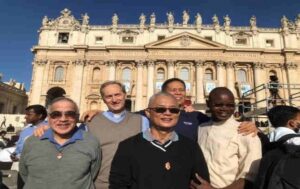 Thank you very much for trusting me and my team with this mandate to serve and animate the fraternities around the world with all our gifts and limitations. Our insecurity to lead has moved us to listen to you – your realities and concerns – through the online survey where we have learned that our fragility as Fraternity urges us to seek one another with firm resolve and not to resign in self-sufficiency where we try to live our lives and ministries like “lone rangers.” Our fragile state has become a new pathway to forging real fraternities where everyone celebrates, challenges, listens and depends on the growth of each other. Above all, thank you very much for your individual witness of life, your courageous fire and zeal for God, the poor and the marginalized, your firm resolve to be a brother to all for the sake of Jesus and the Gospel and your commitment to live the fraternal life as diocesan priests in the footsteps of Brother Charles.
Thank you very much for trusting me and my team with this mandate to serve and animate the fraternities around the world with all our gifts and limitations. Our insecurity to lead has moved us to listen to you – your realities and concerns – through the online survey where we have learned that our fragility as Fraternity urges us to seek one another with firm resolve and not to resign in self-sufficiency where we try to live our lives and ministries like “lone rangers.” Our fragile state has become a new pathway to forging real fraternities where everyone celebrates, challenges, listens and depends on the growth of each other. Above all, thank you very much for your individual witness of life, your courageous fire and zeal for God, the poor and the marginalized, your firm resolve to be a brother to all for the sake of Jesus and the Gospel and your commitment to live the fraternal life as diocesan priests in the footsteps of Brother Charles.
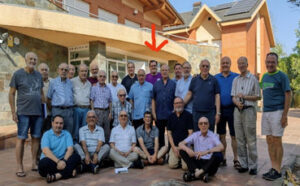 The authentic joy that comes from Jesus’ resurrection sets us all on a humbling yet joy-filled pilgrimage together as spirit-brothers, patiently yet courageously seeking always for what nurtures our hearts amidst the overwhelmingly darkness and confusion of our world, inviting us to listen first before we talk, to understand first before we judge, to preach the Gospel with our lives, to see the face of Jesus in the poor, to heed the cry of Mother Earth and to face life’s challenges with a heart fixed on the coming of the Kingdom in our midst. Like the apostles, seeing an empty tomb with hearts overwhelmed by the confusion, violence and disillusionment of the things that have happened has blinded them from seeing reality with a sense of reflective distance, contemplative wonder and awe. After the resurrection, we are not sent to engage the world like conquerors and little messiahs who disregard the weak in order for the strong to control and dominate. No, we are summoned as lovers, brothers and friends to value every human experience as a place of encounter, to listen to the marginalized, to embrace those who are despised, to challenge the strong, waiting with patience and hope for new life to unfold from the goodness of every human heart and from every human experience.
The authentic joy that comes from Jesus’ resurrection sets us all on a humbling yet joy-filled pilgrimage together as spirit-brothers, patiently yet courageously seeking always for what nurtures our hearts amidst the overwhelmingly darkness and confusion of our world, inviting us to listen first before we talk, to understand first before we judge, to preach the Gospel with our lives, to see the face of Jesus in the poor, to heed the cry of Mother Earth and to face life’s challenges with a heart fixed on the coming of the Kingdom in our midst. Like the apostles, seeing an empty tomb with hearts overwhelmed by the confusion, violence and disillusionment of the things that have happened has blinded them from seeing reality with a sense of reflective distance, contemplative wonder and awe. After the resurrection, we are not sent to engage the world like conquerors and little messiahs who disregard the weak in order for the strong to control and dominate. No, we are summoned as lovers, brothers and friends to value every human experience as a place of encounter, to listen to the marginalized, to embrace those who are despised, to challenge the strong, waiting with patience and hope for new life to unfold from the goodness of every human heart and from every human experience.
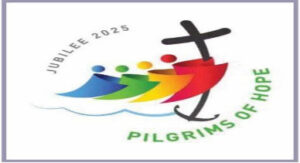 In this jubilee year, we are invited to hope as pilgrims together. The late Pope Francis, in his October 2013 morning meditation, had given two contrasting icons for hope: the anchor and pangs of childbirth. When we are anchored to “an artificial lagoon we ourselves have made… where everything is comfortable and secure. This is not hope”. Rather, the fitting icon for hope is that of labor at childbirth. The whole of creation “has been groaning together in travail until now; we groan inwardly as we wait. We are waiting.” Waiting for new life to unfold is authentic hope. Hope, then, “is intimately involved in the dynamic of giving life” which often “remains invisible and hidden to human eyes.” Yet we know that the Spirit is at work quietly, gently, patiently. “The Spirit is at work in us. He works like a mustard seed, which is small but full of life and power until it grows into a tree. This is how the Spirit works.”
In this jubilee year, we are invited to hope as pilgrims together. The late Pope Francis, in his October 2013 morning meditation, had given two contrasting icons for hope: the anchor and pangs of childbirth. When we are anchored to “an artificial lagoon we ourselves have made… where everything is comfortable and secure. This is not hope”. Rather, the fitting icon for hope is that of labor at childbirth. The whole of creation “has been groaning together in travail until now; we groan inwardly as we wait. We are waiting.” Waiting for new life to unfold is authentic hope. Hope, then, “is intimately involved in the dynamic of giving life” which often “remains invisible and hidden to human eyes.” Yet we know that the Spirit is at work quietly, gently, patiently. “The Spirit is at work in us. He works like a mustard seed, which is small but full of life and power until it grows into a tree. This is how the Spirit works.”
May the Spirit, the Giver of Life, continue to renew our church and world today in surprising ways and may we have the heart to see it, one experience at a time. His way will always be hidden beneath the drama of our time. We need to be interiorly quiet to see that. This is what our spiritual means of daily adoration, desert day, review of life, daily meditation has prepared us.
Here are some practical details for the delegates of our world assembly:
The organizers are asking us to pay in cash the $675/Euro 625 fee.
That we bring a little gift from our country to be given to the brothers.
That we inform Tino about our flight details for airport pick up to our place of meeting.
Brothers, thank you very much. Kindly hold us close to your heart in prayer while we gather at Buenos Aires for our general assembly. We are gathered with you and for you.
Eric LOZADA



